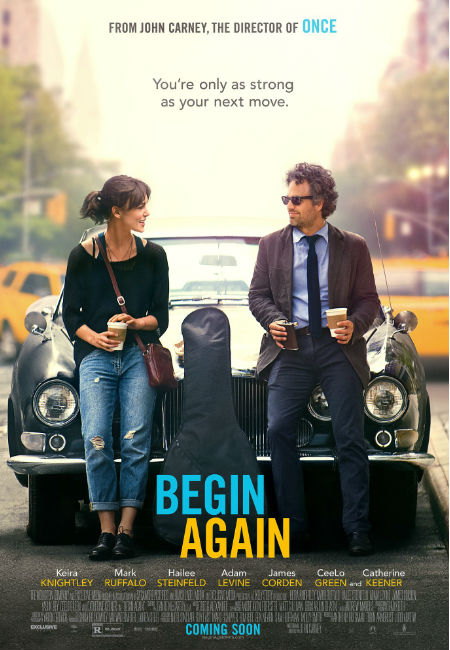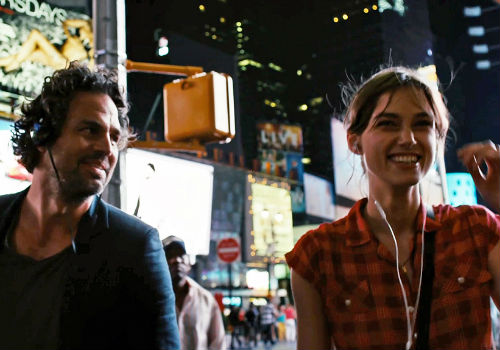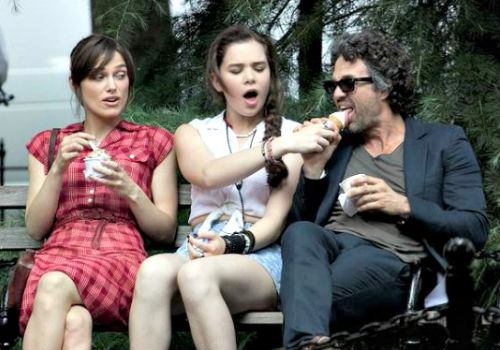
Begin Again, the latest ode to music’s power to change lives from the director of Once, John Carney, is a pleasingly deceptive movie.
Taken on surface value alone, it is a sweet and charming story – in the world of the movie musical these are not pejoratives but rather badges of honour, confirmation you have successfully distilled the idealistic and the romantic into a pleasing concoction – of a jilted rockstar’s girlfriend Gretta (Keira Knightley) who finds herself in a bar one night after an impromptu performance of one of her songs, talking to an A&R rep down on his luck, Dan (Mark Ruffalo), who believes he can launch her into the pop stratosphere.
She is understandably dubious, having witnessed the falsities and indulgent egos of the music industry firsthand through her cad of a boyfriend Dave Kohl (Maroon 5’s Adam Levine who acquits himself well), and her suspicious mindset is not helped by Ruffalo’s inability to pay for the beers he “buys” her while trying to talk her into recording an album on the streets of New York.
You get the feeling Gretta only agrees to Dan’s proposal because she is desperately short of other options.
Living in a cramped New York apartment with her endlessly supportive best mate from Bristol days Steve (James Corden) and adrift without the shared love of songwriting that fuelled her relationship with her ex, she is about to fly back to England to an ill-defined future whose only virtue is that it won’t be taking place in New York City.

So Gretta is very much need of something meaningful with which to fill her days, while Dan is anxious is to prove to his friend and co-founder of the label he once half-owned Saul (Mos Def) that he still has what it takes, that his eye for spotting talent hasn’t departed along with his marriage to Miriam (Catherine Keener) and his estranged relationship with daughter Violet (Hailee Steinfeld).
They are both in need of some kind of salvation, a theme echoed in the film’s original title A Song Can Change Your Life, which better expresses the substantial issues circling with unexpected intensity beneath’s the film’s raffishly easygoing, affable exterior.
Using songs by ex-New Radical’s member Gregg Alexander, whose attractively penned, light-as-air folk pop songs match the film’s ostensibly fey tone rather nicely, Begin Again explores issues like celebrity-induced infidelity, the brittle dryness of a long-lasting marriage and its subsequent breaking apart, and the need for people to have connection and self-reliance in equal measure in an understated manner that gives them a chance to breathe and work themselves out without overly intense narrative attention.
The film is never heavy-handed with its examination of these issues but then neither is it glib or dismissive as is the wont of many musicals where weighty issues are dealt with in merrily bruaque fashion in the space of a song or two.

It’s a delicate balancing act that Carney, who also wrote the screenplay, sustains with seemingly minimal effort, content to let the bright breeziness of the film’s songs and its light disguise the fact that a reasonably weighty film lies within.
It’s much like a comedian discussing all manner of darkly intense issues within the folds of a well-spun joke; it’s only later than you realise how much ground Carney covers in examining the dead-end disappointments of life as the cast sing and play their way through a myriad of outdoor locations throughout New York City.
What lends the film more weight than you might expect is that Carney is content to play with the conventions of the musical to the extent that many of the narrative threads don’t actually go where you think they are going to go.
It’s an enjoyably subversive European mindset that keeps the happy ending intact but twists and turns it ever so slightly so that its outworking defies conventional expectations.
And that means that this most charming and sweet of movies has more storytelling muscle and more emotional heft than you might otherwise think its going to, while still delivering a wholly satisfying, and dare I say, joyous, ending that will leave you skipping out of the cinema pretty much believing anything is possible.
Exactly as the gods of movie musicals intended.